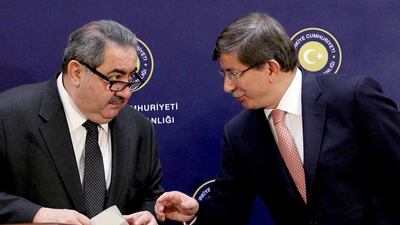ISTANBUL // Turkey’s foreign minister, Ahmet Davutoglu, is preparing a trip to Baghdad this month as part of a major diplomatic effort to mend ties with Iraq after years of tension.
Following a recent visit by Iraqi foreign minister Hoshyar Zebari to Ankara, Turkish officials say they are confident Nouri Al Maliki, Iraq’s prime minister, will also accept an invitation to the Turkish capital.
The surge in diplomatic contacts follows years of difficult relations. Iraq’s Shiite government accused Turkey, a majority Sunni country, of meddling in Iraq’s internal affairs by giving shelter to Tariq Al Hashemi, a Sunni politician who has been sentenced to death in absentia in Baghdad for his alleged role in political killings.
Turkey in turn accused Mr Al Maliki of trying to monopolise power and of being “detracted from the sense of reality”, in the words of a Turkish foreign ministry statement last year.
The two countries also differ in their approach to the conflict in Syria, with Turkey calling for regime change in Damascus, while Iraq claims to be neutral although it is widely seen to be supportive of Bashar Al Assad, Syria’s president.
Another source of friction is Baghdad’s anger over efforts by Turkey to forge closer ties with the government of Iraq’s autonomous Kurdish region (KRG) in the north, which has its own problems with the central Iraqi government.
Booming trade with the KRG region, which is rich in oil, has made Iraq Turkey’s second-biggest export market after Germany, with US$10.8 billion (Dh39.7bn) last year. More than two thirds of Turkish exports to Iraq go to the KRG area, according to analysts.
In return, the KRG exports crude oil to world markets via Turkey, infuriating Baghdad. The central Iraqi government says it alone has the right to make decisions about oil exports. But a KRG official told a conference in Istanbul recently that the Kurdish region would build a new oil export pipeline to Turkey with a capacity of at least one million barrels per day in the next two years.
Despite the unresolved issues, Ankara and Baghdad say they are determined to repair ties. During Mr Zebari’s visit late last month, Mr Davutoglu admitted there had been “stagnation in bilateral relations”. But he underlined the two countries had much to build upon.
“Turkey and Iraq have been brothers for eternity and this brotherhood will last eternally,” he said.
Mr Zebari was equally upbeat, saying problems between the two countries could be overcome by political and diplomatic efforts. “Baghdad and Ankara are only a plane ride of one and a half hours or so apart,” he said.
Mehmet Sahin, a Middle East expert at Ankara’s Gazi University, said upcoming elections in both Turkey and Iraq were driving the rapprochement.
“Maliki wants to calm his own country in order to be re-elected” in parliamentary elections next April, Mr Sahin told said.
He said the Iraqi prime minister, already faced with a wave of violence that killed almost 1,000 people last month alone, did not want more trouble with the KRG or with Iraqi Sunnis. “What will he do if the Kurds or the Sunnis decide to boycott the elections?” Mr Sahin asked.
He said Mr Al Maliki hoped that improved relations with Ankara, which has good contacts with both groups, would help defuse the situation.
Turkey is also interested in better ties with Iraq because of ongoing peace talks between Ankara and rebels of the Kurdistan Workers’ Party, whose headquarters is in northern Iraq, Mr Sahin said.
“There are elections in Turkey as well,” he said, in reference to local polls next March, presidential elections next summer and parliamentary elections in 2015.
Serhat Erkmen of the Ahi Evran University in Kirsehir in central Anatolia said economic reasons also played a role. Turkey needed energy for its booming economy and could not afford to overlook the vast oil resources in southern Iraq despite its increased access to the KRG’s oil.
“It is clear that Ankara will not be able to meet its energy needs if it ignores Baghdad, no matter how active a player it becomes on the KRG energy market,” Mr Erkmen wrote in a recent paper for the Centre for Middle Eastern Strategic Studies, a think tank in Ankara.
Mr Erkmen said Turkey was keen to develop trade ties not only with the KRG, but also with the rest of Iraq.
* With additional reporting by Reuters.
tseibert@thenational.ae

